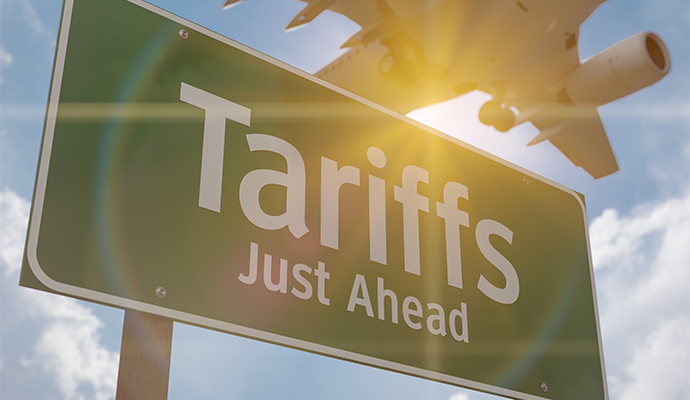Potential Increase in EU duty rates
This is probably the most critical area for Irish Importers right now.
The US and EU are still in trade negotiations to try to avoid a further escalation of the current trade and tariff war which is to conclude by August 1st.
If unsuccessful the US is threating a tariff of 30% on EU imports and the EU, in return, has threatened retaliatory tariffs on a range of US imports.
These retaliatory tariffs, ranging from 10% to 25%, will have ripple effects across the EU retail sector, particularly for companies importing consumer products from the U.S. At present these retaliatory tariffs are suspended until 6th August 2025 however we will have to see how the negotiations play out to determine the risk of these coming into effect.
As a result we recommend that retailers audit their import portfolios to identify exposure looking at tariff codes and origin. For convenience we have included these lists here which we would recommend you review:
While list 2 has not been formally published as yet, the provisional list includes a number of items relevant to retail as per below which may be included:
Product Category | Example Items | CN Code Range | Possible Tariff Rate |
Apparel and Footwear | Jeans, Jackets, Leather Shoes | 6201 - 6217, 6403 | 25% |
Kitchenware and Tableware | Cutlery, Pots, Pans, Utensils | 7323, 8211 | 25% |
Beauty and Personal Care | Cosmetics, Skincare, Perfumes | 3303 - 3307 | 25% |
Home Decor and Furniture | Lamps, Lighting, Wooden Furniture | 9403, 9405 | 25% |
Specialty Foods | Almonds, Peanut Butter, Cranberries | 0802, 2008 | 25% |
Alcoholic Beverages | Bourbon, Craft Beer | 2208 | 25% - 50% |
Toys and Games | Board Games, Puzzles | 9504 | 10% |
Stationery and Office | Pens, Paper Products | 4820 | 25% |
At this point we would recommend customs planning to determine if there are possibilities to reduce the tariff impact and completing an impact assessment per above in the event this is necessary.
Recommendations for Retailers
EU-UK Trade Reset
The United Kingdom - European Union Summit on May 19th was an opportunity for both parties to explore ways to enhance their cooperation. It has now resulted in a reset of the Trade Arrangement between the parties.
Of most relevance is the impact for companies selling food products into Europe as the European Commission and the United Kingdom are proposing a new Common Sanitary and Phytosanitary Area through a Sanitary and Phytosanitary (SPS) Agreement. This initiative aims to simplify the movement of animals, animal products, plants, and plant products by reducing bureaucratic hurdles.
The new SPS Agreement is expected to remove the need for certificates or controls currently required under existing rules, making trade much smoother. It also brings benefits to the movement of goods between Great Britain and Northern Ireland, ensuring Northern Ireland retains its dual market access as outlined in the Windsor Framework. Overall, these SPS measures are designed to harmonise standards and facilitate smoother trade between the UK and the EU, while still upholding high levels of health and safety protection.
This is currently a proposal and we await the finer detail and implementation date in due course. This is very good news for traders and aims to simplify product movements and is expected to eliminate the need for certificates or controls.
Deforestation
The EU Deforestation Regulation (EUDR) is being introduced to ensure products being sold in the EU weren’t produced on land deforested after December 31, 2020. This is part of the EU ESG rules being introduced for Importers along with CBAM, the new Product I.D. system, the ban on the import and sale of products made with Forced Labour etc. Per the EU Commission “the main driver of deforestation is the expansion of agricultural land linked to the production of commodities like cattle, wood, cocoa, soy, palm oil, coffee, rubber, and some of their derived products, such as leather, chocolate, tyres, or furniture”
The Deforestation Regulation introduces new, phased compliance deadlines—now set for December 2025 for larger companies and June 2026 for SMEs—following a recent 12-month postponement. Key compliance steps include submitting due diligence statements via a digital platform, implementing risk assessments, and applying mitigation measures based on country-specific risk classifications: low, standard, or high. Notably, low-risk countries benefit from simplified procedures (They are not obligated to carry out full risk assessments and mitigation) and lower inspection rates (1%) which should help minimize disruption for traders.
Meanwhile standard- and high-risk countries face progressively stricter requirements and inspection rates at 3% and 9% respectively. Presently, only 4 countries have been designated a high-risk rating: Belarus, Myanmar, North Korea, and Russia. Companies looking to source from these countries are likely to be faced with serious challenges in meeting EUDR requirements due to restrictions on trade with these countries and lack of supply chain transparency. Enforcement will be robust, with potential penalties of up to 4% of annual EU turnover and mandated market withdrawals for non-compliance.
To support businesses, the European Commission has released guidance documents and digital tools, aiming to streamline EUDR compliance alongside related regulatory initiatives.
BDO Trade Guide - Key Steps We recommend all Importers and Exporters affected by these measures complete a full supply chain analysis to determine risks and identify any opportunities. We are happy to support in this regard as needed. |
